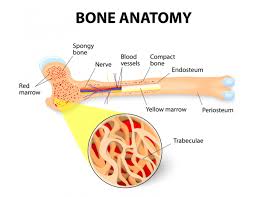
Recently Diagnosed or Relapsed? Stop Looking For a Miracle Cure, and Use Evidence-Based Therapies To Enhance Your Treatment and Prolong Your Remission
Multiple Myeloma an incurable disease, but I have spent the last 25 years in remission using a blend of conventional oncology and evidence-based nutrition, supplementation, and lifestyle therapies from peer-reviewed studies that your oncologist probably hasn't told you about.
Click the orange button to the right to learn more about what you can start doing today.
- You are here:
- Home »
- Blog »
- Multiple Myeloma »
- Myeloma- Hypercalcemia
Myeloma- Hypercalcemia

Dana-Farber Cancer Institute estimates that around 25 percent of people diagnosed with multiple myeloma will develop hypercalcemia as an ongoing complication…
It is commonly understood that multiple myeloma is a blood cancer that can cause your bones to deteriorate. Hypercalcemia, according to the studies linked below, is a more serious symptom than your everyday bone deterioration.
Bisphosphonate therapy, an FDA approved chemotherapy shown to harden bones, is a component of the FDA approved, standard-of-care regimen for all newly diagnosed myeloma patients- induction therapy (RVd), an autologous stem cell transplant followed by low-dose maintenance therapy (usually revlimid).
Myeloma weakens bones therefore increasing your risk of bone fractures. Hypercalcemia is more serious and requires greater understanding.
- a 2020 study found that roughly 91.2 percent of people with multiple myeloma experienced bone destruction…
- while only about 16.8 percent had hypercalcemia…
- The 2020 study mentioned earlier found that kidney damage affected about 81.8 percent of people with multiple myeloma…
A diagnostic tests called serum calcium, eGFR, BUN and creatinine will indicate you kidney health as well as how much calcium is in your blood. Increased levels of calcium in your blood can complicate both your kidney function.
The focus of this post is that hypercalcemia is a serious symptom of multiple myeloma. Bisphosphonate and denosumate therapies may resolve your serum calcium problems though, according to the studies below, no always.
Please consider learning as much as you can about both conventional and evidence-based non-conventional bone and kidney therapies.
- Multiple Myeloma Chemos That Cause Kidney Damage
- Myeloma, Zoledronic Acid, Renal Dysfunction, Bone
- Myeloma- Kidney Damage- Natural Detox
- Kidney Failure, Bone Damage- Myeloma
- Myeloma Diet for Kidney Involvement
- Myeloma Stats- Kidney, Bone, Deaths
- Coffee- Bone, Liver, Kidney for MM
- Kidney, Heart, Bone. Co-Morbidities
Have you been diagnosed with multiple myeloma? Do you have high levels of calcium in your blood? Bone involvement? Kidney involvement? Scroll down the page, post a question or a comment and I will reply to you ASAP.
Thanks and hang in there,
David Emerson
- MM Survivor
- MM Cancer Coach
- Director PeopleBeatingCancer
First Guidelines for Treating Hypercalcemia in Cancer Patients
“Hypercalcemia of malignancy (HCM) is the most common metabolic complication seen in patients with cancer, and is associated with a high degree of morbidity and mortality. It affects an estimated 2%–30% of patients, and most frequently occurs in patients with breast, lung, and renal cancer, as well as multiple myeloma…
Healthcare professionals currently have few evidence-based recommendations for which medications to use to treat this condition, he added…
How Does Hypercalcemia Complicate Multiple Myeloma?
“According to a 2020 studyTrusted Source that followed 357 people with multiple myeloma, 16.8 percent had hypercalcemia at the time of diagnosis. The Dana-Farber Cancer Institute estimates that around 25 percent of people diagnosed with multiple myeloma will develop hypercalcemia as an ongoing complication…
When your calcium levels rise above the usual range, it’s called hypercalcemia…
Your body is made up of a number of essential minerals, and calcium is one of them. Calcium is stored in your bones and teeth, making them strong and hard. Calcium is also used to help transmit nerve signals, move blood, and manage hormone levels.
Two measurements are used to gauge the amount of calcium in your body: serum calcium and ionized calcium. Serum calcium is a count of how much calcium is in your blood. Ionized calcium, also known as free calcium, measures the total amount of calcium in your body.
Usual ranges for each of these are:
- serum calcium: 8.6 to 10.3 mg/dL
- ionized calcium: 4.4 to 5.2 mg/dL
Why does hypercalcemia develop in people with multiple myeloma?
There are several reasons why your calcium levels can rise with multiple myeloma. The main reason is believed to be the destruction of bone from the lesions caused by multiple myeloma.
When bones are destroyed, they release extra calcium into your bloodstream and increase your calcium levels.
However, a 2020 study found that roughly 91.2 percent of people with multiple myeloma experienced bone destruction while only about 16.8 percent had hypercalcemia. This suggests calcium imbalances can come from other sources, too…
There may also be an underlying secondary cause of hypercalcemia in people with multiple myeloma, like an overactive parathyroid gland. Overactivity in this gland may also be an underlying cause of hypercalcemia.
Kidney damage is also a frequent complication of multiple myeloma. Kidneys can play an important role in regulating calcium. The 2020 study mentioned earlier found that kidney damage affected about 81.8 percent of people with multiple myeloma…
People with multiple myeloma who also develop hypercalcemia have an overall lower survival rate than those without this complication. On average, they live roughly 20 months less than multiple myeloma patients without hypercalcemia.
The link between hypercalcemia and more severe multiple myeloma is so strong that it’s used as an indicator of organ damage.
CRAB symptoms in multiple myeloma
According to the Dana-Farber Cancer Institute, organ damage in multiple myeloma is diagnosed based on the presence of CRAB symptoms, which include:
- C = calcium levels (increased)
- R = renal (kidney) dysfunction
- A = anemia
- B = bone lesions


